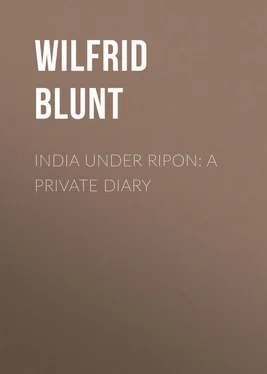Wilfrid Blunt - India Under Ripon - A Private Diary
Здесь есть возможность читать онлайн «Wilfrid Blunt - India Under Ripon - A Private Diary» — ознакомительный отрывок электронной книги совершенно бесплатно, а после прочтения отрывка купить полную версию. В некоторых случаях можно слушать аудио, скачать через торрент в формате fb2 и присутствует краткое содержание. Жанр: foreign_antique, foreign_prose, на английском языке. Описание произведения, (предисловие) а так же отзывы посетителей доступны на портале библиотеки ЛибКат.
- Название:India Under Ripon: A Private Diary
- Автор:
- Жанр:
- Год:неизвестен
- ISBN:нет данных
- Рейтинг книги:4 / 5. Голосов: 1
-
Избранное:Добавить в избранное
- Отзывы:
-
Ваша оценка:
- 80
- 1
- 2
- 3
- 4
- 5
India Under Ripon: A Private Diary: краткое содержание, описание и аннотация
Предлагаем к чтению аннотацию, описание, краткое содержание или предисловие (зависит от того, что написал сам автор книги «India Under Ripon: A Private Diary»). Если вы не нашли необходимую информацию о книге — напишите в комментариях, мы постараемся отыскать её.
India Under Ripon: A Private Diary — читать онлайн ознакомительный отрывок
Ниже представлен текст книги, разбитый по страницам. Система сохранения места последней прочитанной страницы, позволяет с удобством читать онлайн бесплатно книгу «India Under Ripon: A Private Diary», без необходимости каждый раз заново искать на чём Вы остановились. Поставьте закладку, и сможете в любой момент перейти на страницу, на которой закончили чтение.
Интервал:
Закладка:
The same night we dined at Guindi with the Governor, Mr. Grant Duff, “a thin, sickly, querulous man” is my comment on him, “out of temper with everything around him, yet paid ten thousand a year by the Madras Indians for ruling them.” I find no record of his conversation, but remember that his manner to me was somewhat reserved and suspicious. We did not get back to Lippert’s Hotel till midnight.
“ 23rd Nov. – Our night’s rest was short, for our train started at six forty-five. Young Varada Rao was waiting for us at the station to say good-bye. He has sent his servant with us to Tirupati, where we are to meet his father Rama Rao, who has gone there with other native big-wigs and a number of Pundits to open a Sanskrit College. We are invited to take part in the doings there, but shall be too late for the actual ceremony, which begins at ten. Our visit to Madras has been on the whole successful. Though we began without much introduction, we have established capital relations with all the leading Hindus of the place. The Mohammedans we have seen less of. They are of little energy or importance in the Presidency. Their social leaders are pensioned by, and so dependent on, the Government. The rest are poor and unprogressive.”
It may here be said that we left Madras accompanied by a very excellent servant, a native Christian named Solomon, who had been provided for us by our friend Ragunath Rao. Solomon was a dignified and altogether worthy old man, absolutely honest and faithful in his service, and with but a slight knowledge of English. As he was the only native Christian with whom we came in contact in India, I am glad to be able to give him this high character.
“Tirupati is a very beautiful place, surrounded by high hills, and is a celebrated resort of Brahmin pilgrims from all parts of India. The temple, though not very large, has a splendid pagoda at the entrance, and stands in the middle of the town, and there are other pagodas at a distance, leading up to a sacred hill not very far away. The ceremony was over when we arrived at the bungalow, which had been fitted up at great expense for the expected guests. It was very hot, and the drive from the station had been tiring, in country bullock carts drawn by ponies, and we were glad to rest in the shade, though we had missed the expedition to the sacred hill which had followed the ceremony. A good luncheon had been prepared for us, and soon after Rangiar Naidu arrived and took us over the temple and the town. The gala preparations, he informed us, were in honour of Mr. T., an English official who had come to represent the Governor on the occasion. He was away with the rest on the sacred hill, and would not be back till after dark. Rangiar Naidu besought us not to let him, or any of those with him, know of our intended visit to the villages, as he would certainly prevent it. This T., he said, has a reputation of being a friend of the natives on the ground of his knowing something of Sanskrit, and patronizing their educational institutions, but Rangiar and all our friends are suspicious of him; – old Ragunath Rao spoke of him yesterday very plainly as a humbug. About nine o’clock, after great lighting of lamps in a kiosk, the party from the hill returned, escorting the Government officials in all state – T. a dry, stiff-looking civilian, very much on his dignity, and surprised and rather disgusted to find us here. It was evident that Rama Rao had not told him how we had been invited by his son, and I let the cat out of the bag, without intending it, by telling Rama Rao in the official hearing that Varada had come to see us off at the station, and Rama looked confused and began to talk of other things. It was painful to see the fear everybody was in of this very ordinary Englishman, but I suppose he has the power to ruin them, and that he and his like do ruin those that cross them. With him was another Englishman, the head of a school department, a more genial man, and one other. A dinner for a hundred had been prepared, but no more English had come than these three, and so we five sat down and ate what we could of it.
“T. was not communicative, but nevertheless we made conversation on various more or less political subjects, the school inspector, who liked talking, helping us not a little. Afterwards I had some conversation apart with Rama, but both he and the Pundits were too frightened to say much so near the ‘presence.’ They, poor people, had brought a piece of gold or silver plate to give to the great man, an offering which he received without a word of thanks, and had put in his carriage; only to two or three did he vouchsafe a few words, remaining seated while they stood to listen. It is inconceivable why these Indians should put themselves to the trouble of entertaining at such expense and to so little profit. The kiosk alone cost £30 they told us, and the whole entertainment cannot have cost far short of £100, which would have better gone in helping to endow the College. Government gives nothing, and the thing is to be supported by the funds of the Temple, which are large. It was amusing to see the relief which came over everybody when the officials had left, as they did as soon as the fireworks were over, about eleven. We, too, were not sorry. As there were no beds, we slept on the floor, on which, also, the servants and the poor people from outside soon after rolled themselves up – it was a large place – very happily with Mr. T.’s cushions and carpets.
“I have forgotten to say what was to me the most interesting part of the day’s proceedings. While waiting in the shade of a grove that afternoon we had seen a procession come to a little shrine with offerings close by – a beautiful pagan rite, with drums and pipes leading the way, and behind a number of women walking with large copper dishes on their heads filled with rice and flowers as offerings to the god. They stopped under the grove near us, and there lit fires and cooked their rice – a merry party sitting on all the afternoon. Towards evening the women approached the altar, which was an oblong table of stone supported by a dozen upright slabs carved with curious devices. Each woman chose her slab, and painted it with ochre, yellow and red, and then crowned it with flowers. I asked what it signified. They told me it was Friday, one of the fortunate days, and that the women had come to pray for fertility. The rice, after being offered, they will eat, and count it as a feast. It is seldom the peasants get so good a meal, for their usual food is only a cake made of a kind of rape. Rice is held to be too good for common fare.” This was an interesting day spent in beautiful surroundings, and remains in my mind as one typical of Southern India.
“ 24th Nov. – In the morning Rangiar Naidu came according to promise with two pony carts, and took us to see the villages. On the way he explained to us the history of the Sanskrit College and yesterday’s festivities. Some years ago the English Government, in pursuance of its policy of non-interference with religious affairs, gave up its inherited guardianship of the Hindu temples to native trustees, known locally as ‘churchwardens.’ But the transfer was made with so little care that in many instances the trustees had been able to evade the law, and make themselves to all intents and purposes owners of the estates. In the case of Tirupati, the income is very large, several lakhs of rupees, and has become vested in the hands of a single man, R. S., known by his official title of Mohunt. The abuse of trust in the Madras Presidency had become, however, so notorious that last year an attempt was made in Council to pass a bill in remedy of the evil. But this had been strongly opposed by Mr. T., and so defeated, to the anger of pious Hindus towards T., but the gratitude of the Temple wardens. It is by these, or rather by the single Mohunt, that yesterday’s festivities were arranged. The Sanskrit College is an act of expiation to cover a misappropriation of the funds, since these are not for education but for the maintenance of the Temple. As for Rama Rao, his timidity is explained by his being a member of the Council, and so revocable at the will of the Government after his three years term of office. Rama Rao’s family came from Hyderabad four generations back, where they were servants of the Nizam, but on the occasion of a marriage they had followed the Nawab of Arcot to Madras. Their language at home is Telegu, which is that of the Hindus of the Deccan.”
Читать дальшеИнтервал:
Закладка:
Похожие книги на «India Under Ripon: A Private Diary»
Представляем Вашему вниманию похожие книги на «India Under Ripon: A Private Diary» списком для выбора. Мы отобрали схожую по названию и смыслу литературу в надежде предоставить читателям больше вариантов отыскать новые, интересные, ещё непрочитанные произведения.
Обсуждение, отзывы о книге «India Under Ripon: A Private Diary» и просто собственные мнения читателей. Оставьте ваши комментарии, напишите, что Вы думаете о произведении, его смысле или главных героях. Укажите что конкретно понравилось, а что нет, и почему Вы так считаете.












